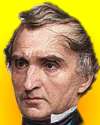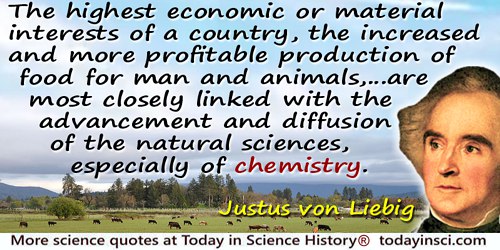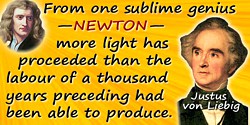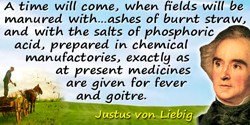 (source)
(source)
|
Justus von Liebig
(12 May 1803 - 18 Apr 1873)
German chemist who was not only a founding father of organic chemistry, but is notable as an influential teacher. He transformed scientific education, medical practice and agriculture.
|
Justus von Liebig Quotes on Chemistry (6 quotes)
>> Click for 30 Science Quotes by Justus von Liebig
>> Click for Justus von Liebig Quotes on | Chemist |
>> Click for 30 Science Quotes by Justus von Liebig
>> Click for Justus von Liebig Quotes on | Chemist |
I will now direct the attention of scientists to a previously unnoticed cause which brings about the metamorphosis and decomposition phenomena which are usually called decay, putrefaction, rotting, fermentation and moldering. This cause is the ability possessed by a body engaged in decomposition or combination, i.e. in chemical action, to give rise in a body in contact with it the same ability to undergo the same change which it experiences itself.
— Justus von Liebig
Annalen der Pharmacie 1839, 30, 262. Trans. W. H. Brock.
I would... establish the conviction that Chemistry, as an independent science, offers one of the most powerful means towards the attainment of a higher mental cultivation; that the study of Chemistry is profitable, not only inasmuch as it promotes the material interests of mankind, but also because it furnishes us with insight into those wonders of creation which immediately surround us, and with which our existence, life, and development, are most closely connected.
— Justus von Liebig
Familiar Letters on Chemistry (1859), 4th edn., 1.
If you want to become a chemist, you will have to ruin your health. If you don’t ruin your health studying, you won’t accomplish anything these days in chemistry.
— Justus von Liebig
Liebig's advice to Kekulé. Quoted in Berichte der Deutschen Chemischen Gesellschaft, 23, 1890. Trans. W. H. Brock.
In the progressive growth of astronomy, physics or mechanical science was developed, and when this had been, to a certain degree, successfully cultivated, it gave birth to the science of chemistry.
— Justus von Liebig
Familiar Letters on Chemistry (1851), 2.
Only about seventy years ago was chemistry, like a grain of seed from a ripe fruit, separated from the other physical sciences. With Black, Cavendish and Priestley, its new era began. Medicine, pharmacy, and the useful arts, had prepared the soil upon which this seed was to germinate and to flourish.
— Justus von Liebig
Familiar Letters on Chemistry (1851),5.
Without an acquaintance with chemistry, the statesman must remain a stranger to the true vital interests of the state, to the means of its organic development and improvement; ... The highest economic or material interests of a country, the increased and more profitable production of food for man and animals, ... are most closely linked with the advancement and diffusion of the natural sciences, especially of chemistry.
— Justus von Liebig
Familiar Letters on Chemistry (1851), 3rd edn., 19.
See also:
- 12 May - short biography, births, deaths and events on date of Liebig's birth.
- Justus von Liebig, Nature of Decay - from Familiar Letters in Chemistry (1844).
- Justus von Liebig: The Chemical Gatekeeper, by William H. Brock. - book suggestion.




 In science it often happens that scientists say, 'You know that's a really good argument; my position is mistaken,' and then they would actually change their minds and you never hear that old view from them again. They really do it. It doesn't happen as often as it should, because scientists are human and change is sometimes painful. But it happens every day. I cannot recall the last time something like that happened in politics or religion.
(1987) --
In science it often happens that scientists say, 'You know that's a really good argument; my position is mistaken,' and then they would actually change their minds and you never hear that old view from them again. They really do it. It doesn't happen as often as it should, because scientists are human and change is sometimes painful. But it happens every day. I cannot recall the last time something like that happened in politics or religion.
(1987) -- 


